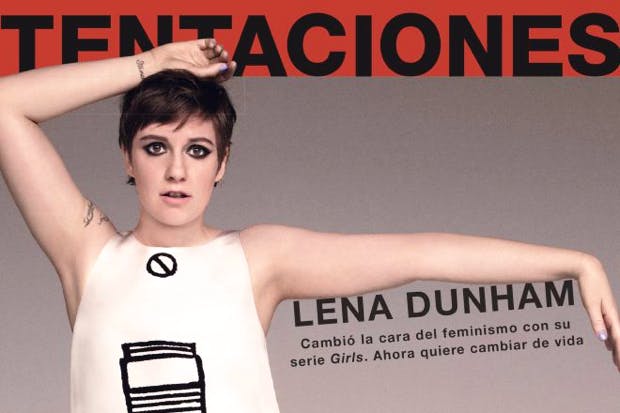Let’s take a moment to celebrate Lena Dunham. OK, so she stinks as an actress and her brand of self-indulgent, pity-me feminism leaves me cold. But credit where it’s due: she’s now managed to unite America’s culture-warring and politically divided population. Surely a Nobel Peace Prize nomination can’t be far behind. Loathing for Lena has gained such momentum it has spawned its own insult. It’s the worst insult that could possibly be levelled against a white, bourgeois but self-berating, feminist-identifying and politically ‘woke’ woman: ‘hipster racism’.
For those struggling to keep up (aren’t we all nowadays?) Dunham has, over the years, fuelled panics about campus rape culture, suggesting ‘sexual assault is an epidemic’. She’s also championed the view that women coming forward with accusations of rape are to be unconditionally believed.
In recent weeks, there’s been much for Dunham to get behind. More and more women have come forward with accusations of abuse at the hands of powerful directors, producers and actors. If Weinstein and his ilk are found guilty of even half the offences they stand accused of then they deserve everything coming their way. But they do need to be found guilty in a court of law; Dunham’s belief in the word of the victims is itself not enough to find someone guilty.
But then, last week, Dunham found a woman whose story she didn’t believe unconditionally. On Friday, actress Aurora Perrineau accused Murray Miller, one of the writers of Girls, the drama series devised by and starring Dunham, of raping her when she was 17. Rather than rushing to believe and defend Perrineau; rather than finding Miller guilty and detailing her nausea at his crimes, Dunham defended him. She made a statement in support of her friend and colleague: not the woman accusing him.
Dunham – along with Girls collaborator Jenni Konner – wrote that:
‘During every time of change there are also incidences of the culture, in its enthusiasm and zeal, taking down the wrong targets. We believe, having worked closely with him for more than half a decade, that this is the case with Murray Miller. While our first instinct is to listen to every woman’s story, our insider knowledge of Murray’s situation makes us confident that sadly this accusation is one of the 3 percent of assault cases that are misreported every year.’
The backlash against Dunham was as swift as it was ferocious. On top of the obvious charge of hypocrisy came the accusation of racism. Perrineau is mixed race and Dunham stands accused of tapping into racist stereotypes that position black women as ‘overtly sexualised, fetishised and objectified in the media.’ Zinzi Clemmons, a Lenny Letter writer, announced that she would no longer write for the site; she said of Dunham: ‘She cannot have our words if she cannot respect us.’
Ironically, Dunham is first in line to self-flagellate about the problematic nature of ‘whiteness’. She placed Trump’s victory squarely at the feet of the white women, ‘so unable to look past their violent privilege, and so inoculated with hate for themselves.’ So the racism Dunham’s accused of is not overt but ‘hipster’, ‘which typically uses sarcasm as a cover, and in the end, it looks a lot like gaslighting.’ When called out on it, Clemmons tells us, the excuse would be ‘It’s just a joke. Why are you overreacting?’
Dunham has issued the now obligatory apology. Oddly, she recognises ‘it was absolutely the wrong time to come forward with such a statement.’ But accusations of racism stick and the hatred for Dunham continues apace. As someone who can lay claim to hating Dunham before it became popular, it is tempting just to delight in being ahead of the curve, for once. Camille Paglia described Denham as ‘a big pile of pudding’ and I couldn’t agree more.
Dunham – the self-declared voice of a generation – is an over-indulged, narcissistic, talentless idiot. She’s made a career out of denying her many privileges and seeking out victimhood at every opportunity. But – like a stopped clock – Dunham was right that in the throes of a witch hunt, sometimes accusations fall wide of the mark. She’s right that sometimes, for all kinds of reasons, women might make false accusations. The idea that women are so childishly pure and innocent we are incapable of ever uttering an untruth does women no favours.
What’s lousy is that Dunham chose to defend her friend and throw Perrineau under a bus rather than make a more general point. Her statement – and the clumsy apology – both reek of hypocrisy. But if we’re hating on Dunham let’s make sure we’re doing it for the right reasons. Right now, we desperately need someone with the balls to say that yes, women do sometimes make false accusations. Lena Dunham is clearly not that woman.
Joanna Williams is the author of Women vs Feminism







Comments